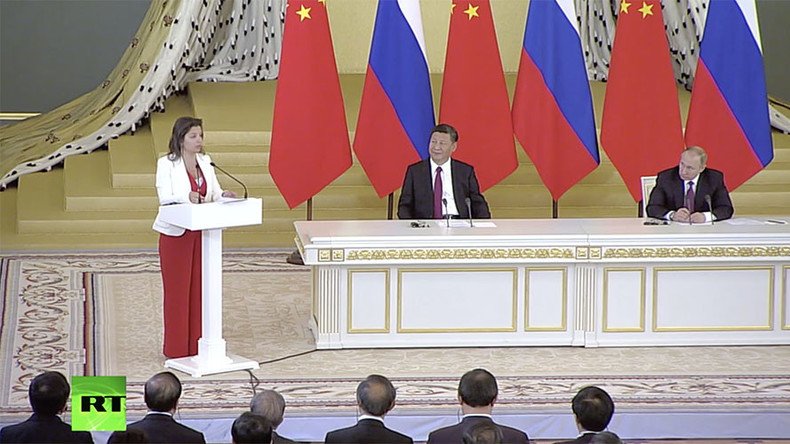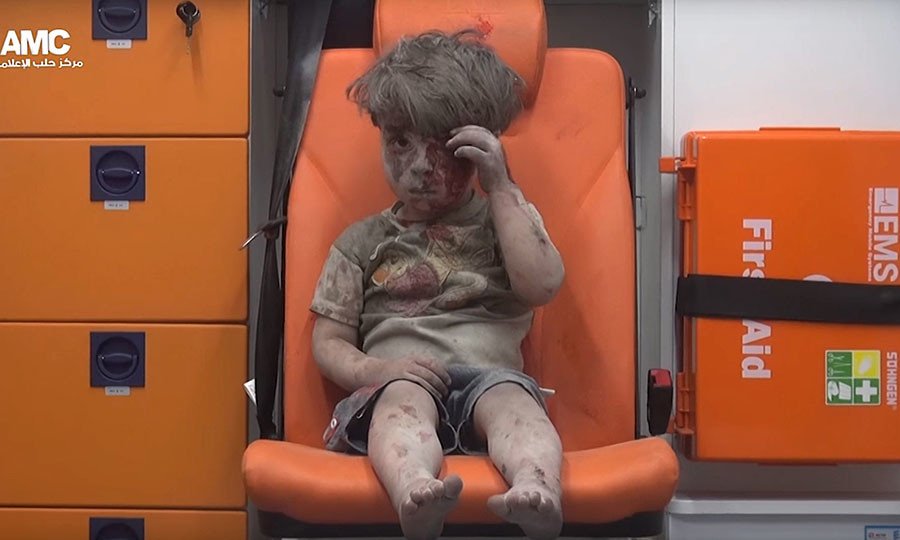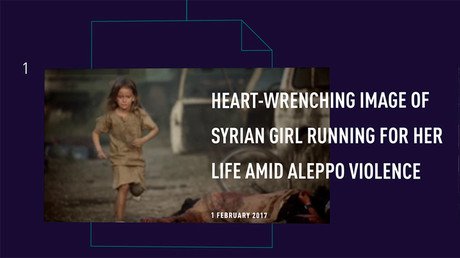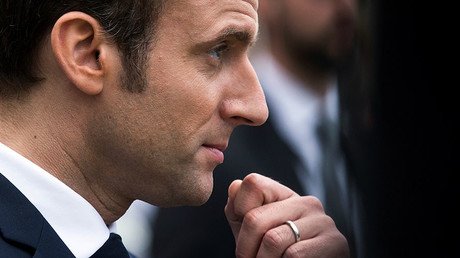Not a single war in recent years has started without powerful press ‘artillery’ – RT editor-in-chief

There has not been a war in recent times that began without “a powerful press artillery” and “precision bombing” by media, RT Editor-in-Chief Margarita Simonyan said, speaking in front of President Putin and Chinese leader Xi Jinping.
Simonyan expressed her concern over the media’s growing, and often boundless, influence and the way it changes the world around us, during Chinese President Xi Jinping’s state visit to Moscow.
“We live in unique times, when media – the so-called fourth estate – in many countries is trying to become, and sometimes becomes, the first: sets the rules of the game, controls public opinion, doesn’t just change people’s attitude towards a leader or a state, but alters the values of entire societies,” RT’s editor-in-chief said.
The media has become a weapon and a life-changing tool at the same time, Simonyan said.
“Not a single war in recent years started without a powerful world press ‘artillery,’ not a single battle happened without previous precision bombing by TV, radio, newspapers, and online resources,” she said.
The media can also change people’s perceptions of public figures, like “making an unheard-of, ordinary person, like, for instance, Barack Obama, the hero of a generation overnight; or vice versa, making a generation’s hero, like Julian Assange, into an outcast and a misfit.”
Even more than that, “the media can change the fates of entire nations, their leaders, and sometimes even shift the borders: for instance, Kosovo wouldn’t ever have been possible without one-sided and biased coverage by all the world media, by the so-called mainstream, with no exception,” Simonyan added.
The media’s impact can be, and often is, purposefully damaging and detrimental, she said.
“This power of the press, sometimes boundless, can be used for the good – when we save the innocent, fight injustice, tyranny, corruption – or to do damage, when the media provides for the aggressive foreign policy of a country, illustrating it with convenient pictures.”
Simonyan also provided a striking example of media adjusting the narrative to fit in with their agenda.

“Everyone remembers the boy Omran, who became a symbol of Assad’s so-called ‘atrocities.’ This photo was on the front covers of all world media, spread by all of the mainstream. Of course, who wouldn’t feel sorry for a boy dug up from under the rubble, covered in blood and soot? We found the boy’s family a month ago. His father supports Assad, and he told us this really scary story about how an infamous humanitarian organization basically snatched the boy out of his father’s hands, not letting him perform first aid, to take the photos and give them to the journalists. And he is not being heard.”
Sometimes it seems that some media may resort to any means to ensure their agenda stays in place, and here’s where fake news comes in handy, Simonyan said. When it comes to that, few countries are under attack as often and as consistently as China and Russia, she added.
“Fake news has become a trap, snaring millions of people used to trusting major media names, who shouldn’t be trusted for a long time now. Blatant lies that used to be reserved for tabloids are now doing the rounds in the world media, and from their pages, those lies are put into the mouths of the newly-minted leaders.”
An astonishing example, Simonyan said, is new French President Emmanuel Macron, who, along with his staff, has been insisting that RT and the Sputnik News Agency distributed fake news about him during the election – something that never happened.
“We never published them, this just didn’t happen,” she said. “But no-one is really interested in that, it’s about deflecting attention.”
“A similar story happened to Hillary Clinton’s correspondence, when no one in mainstream media was interested in what the emails were about or what kind of light they cast on the US politics, but they were interested in who leaked them – must be Russian hackers.”
She called on the Chinese media to unite and provide a picture that could be far from the mainstream media, but closer to the truth.
“The world where everyone sings the same song and doesn’t hear any other voices, any other songs, is a dangerous world. It’s a world where, to the loud jeering of the mainstream media, they bomb Iraq, Libya, Syria, create Al-Qaeda or ISIS, then get terrified by it. Our country has repeatedly offered to the West to fight terrorism together, in Syria and the entire world. The West doesn’t want to do it together, so let’s not make the same mistake in our area of expertise. Today we offer you, our Chinese colleagues, to fight information terrorism together.”














